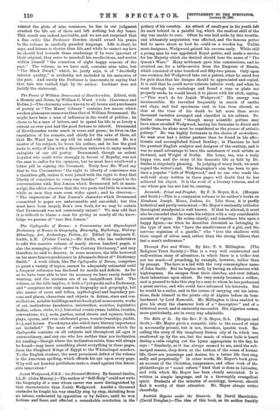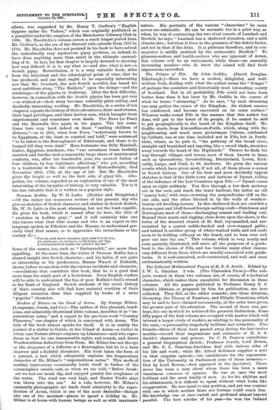Scottish Gypsies under the Stewarts. By David Macritchie. (David Douglas.)—The
idea of this book, as its author frankly
allows, was suggested by Mr. Henry T. Crofton's " English Gypsies under the Tudors," which was originally published as a pamphlet under the auspices of the Manchester Literary Club in 1886. Mr. Macritchie's volume covers a much longer period than Mr. Crofton's, as the era of the Stewart rule extends from 1371 to 1714. Mr. Macritchie does not pretend in his book to have solved the undoubtedly very mysterious gipsy problem, or, indeed, to have done anything more than assist in the ultimate unravel- ling of it. In fact, his first chapter is largely devoted to showing how very difficult it is to say what is—and also what is not—a Scotch gipsy. Nevertheless, it is a very valuable book, alike from the historical and the ethnological point of view, that he has produced, and one that ought to be especially interesting now that Mr. Crockett, the new Scotch novelist, has based his most ambitions story, " The Raiders," upon the doings—and the misdoings—of the gipsies in Galloway. After the first difficulty, however, in connection with the Scotch gipsies has been got over —or winked at—their story becomes tolerably plain sailing, and decidedly interesting reading. Mr. Macritchie, in a series of ten chapters, repeats the history of their adventures, their misfortunes, their legal privileges, and their lawless acts, which brought them imprisonment and sometimes even death. The Faws (or Fees) and the Maxwells live again in his pages. The law some- times bore very hard indeed on these " smiling children of distress,"—as in 1611, when four Paws, "notoriously known to be Egyptians, at the least so reputed and held," were sentenced " to be taken to the Boroughmuir of Edinburgh, and there to be hanged till they were dead." More fortunate was Billy Marshall, tinker, Egyptian, murderer, who "was seventeen times lawfully married, and besides such a reasonably large share of matrimonial comforts, was, after his hundredth year, the avowed father of four children, by less legitimate affections," who yet, according to a tombstone in the old churchyard of Kirkcudbright, died November 28th, 1792, at the age of 120. But Mr. Macritchie gives the bright as well as the dark side of gipsy life. Alto- gether, his volume, regarded as an exploration of one of the most interesting of the by-paths of history, is very valuable. Nor is it the less valuable that it is written in a popular style.



















































 Previous page
Previous page